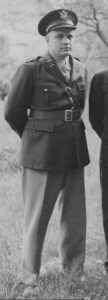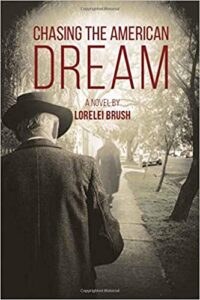 Readers often ask me where I get the idea for a book. As I suggested in my first posts, I write novels to resolve the conundrums I encounter in life. For Chasing the American Dream, the issue came from living with my angry father, whose constant irritation seemed to come from being frustrated that his American Dream had not come true. Edwin Brush, Sr., pictured at the right in 1942, died in 1972. If I wanted to figure out why he had been so angry and often lashed out at me, I was on my own.
Readers often ask me where I get the idea for a book. As I suggested in my first posts, I write novels to resolve the conundrums I encounter in life. For Chasing the American Dream, the issue came from living with my angry father, whose constant irritation seemed to come from being frustrated that his American Dream had not come true. Edwin Brush, Sr., pictured at the right in 1942, died in 1972. If I wanted to figure out why he had been so angry and often lashed out at me, I was on my own.
I’d heard a lot from him about his early life, pre-World War II, and fascinating heroic stories about his activities during the war. I set out to search the National Archives to learn more about his assignments, maybe write a spy novel about them. He’d told me, for example, that he’d been dropped by the Allied Forces behind German lines and taken on the identity of a major in the German Army. His code name was Lorelei, and because it had kept him safe, he wanted to give it to me. Very early on in my research, I discovered no OSS agent ever had the code name of Lorelei, and the Allies never installed a spy in Germany who wasn’t a native speaker. My dad rated his speaking German as “poor” at the end of the war. Why had he lied to me? It seemed as though something important had happened that I didn’t know about.
To work out what the cause might have been, I conceived a character, David Svehla, who felt cheated by WW II. Like my father, David wanted to be a hero, but didn’t have the opportunity. At first, he was assigned to a company in Akron, Ohio, to make gas masks for children with the face of a Disney character. He found it humiliating to tell fellow soldiers shipping overseas that (literally) he had a Mickey Mouse job. When David, like Dad, volunteered for OSS and went overseas, he was assigned first to an administrative role in London, and then to microfilm documents that American scientists badly needed. These were hardly the jobs of classic heroes.
From this point, the story deviates from my father’s. I shift to 1955, when this frustrated hero is not succeeding in his career. He teaches high school science and has completed a law degree at night. However, he has a family to support and can’t see how to drop the steady paycheck from teaching on the chance he could develop sufficient clientele from legal work to pay the bills. He spots an S.S. Major he caught at the end of the war and shipped to Nuremberg. Why is the man striding down the streets of Cleveland?
 Chapter 1 starts with David in an Army truck approaching the V-2 rocket facility and its attendant labor camp. There, David befriends Jacob, a Jewish electrician who helps David search for the scientists he needs to interrogate and their documents. In 1955 Cleveland, David tells Jacob about the S.S. man and the two men plunge into a crisis. Can Jacob forgive this man who terrorized him? Can David forgive himself for not being his idea of a hero?
Chapter 1 starts with David in an Army truck approaching the V-2 rocket facility and its attendant labor camp. There, David befriends Jacob, a Jewish electrician who helps David search for the scientists he needs to interrogate and their documents. In 1955 Cleveland, David tells Jacob about the S.S. man and the two men plunge into a crisis. Can Jacob forgive this man who terrorized him? Can David forgive himself for not being his idea of a hero?
Jacob introduces David to the Jewish strategy of acknowledgement and atonement for sins. Jacob believes he need only forgive Adler if the man says he regrets his actions and demonstrates that he has changed. Jacob is willing to try. But he struggles with forgiving himself for surviving the war, just as David wrestles with forgiving himself for not being a battlefield hero. The remainder of the book explores their “adventures” on the road to forgiveness.
Working out how they would get to that point turned out to be a process that allowed me to explore forgiveness for my father. I had to engage with all the details of what he had done, figure out reasons for his actions, and let go of my own anger that he wasn’t the loving and supportive parent I wanted. The “right ending” of the story was one that allowed my forgiveness, which came in the form of immense relief and total release of anger.
Hopefully, many of you will not need to write a novel to reach this point with the problematic people in your lives. For me, it took years, with many starts and stops. May you find your way along as you see fit: journaling, poetry, art, or novels!
If you would like further information, here are two talks I’ve given:
In a session for the Patrick Henry Library March 11, I discuss the history behind the book:
In this interview conducted through One More Page bookstore February 10, Sara Fitzgerald interviews me about my writing and the book: